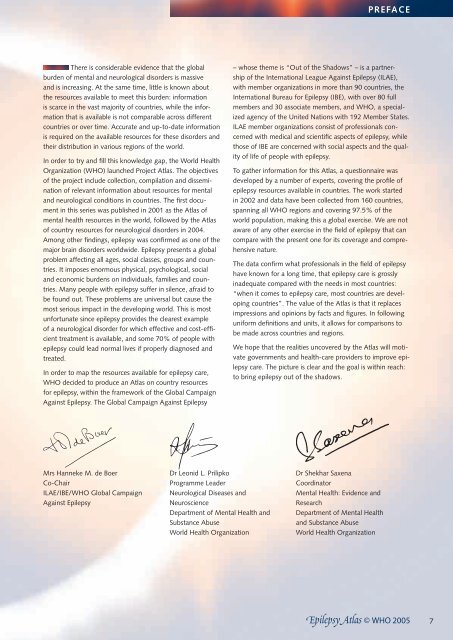Epilepsy - World Health Organization
Epilepsy - World Health Organization
Epilepsy - World Health Organization
Create successful ePaper yourself
Turn your PDF publications into a flip-book with our unique Google optimized e-Paper software.
There is considerable evidence that the global<br />
burden of mental and neurological disorders is massive<br />
and is increasing. At the same time, little is known about<br />
the resources available to meet this burden: information<br />
is scarce in the vast majority of countries, while the information<br />
that is available is not comparable across different<br />
countries or over time. Accurate and up-to-date information<br />
is required on the available resources for these disorders and<br />
their distribution in various regions of the world.<br />
In order to try and fill this knowledge gap, the <strong>World</strong> <strong>Health</strong><br />
<strong>Organization</strong> (WHO) launched Project Atlas. The objectives<br />
of the project include collection, compilation and dissemination<br />
of relevant information about resources for mental<br />
and neurological conditions in countries. The first document<br />
in this series was published in 2001 as the Atlas of<br />
mental health resources in the world, followed by the Atlas<br />
of country resources for neurological disorders in 2004.<br />
Among other findings, epilepsy was confirmed as one of the<br />
major brain disorders worldwide. <strong>Epilepsy</strong> presents a global<br />
problem affecting all ages, social classes, groups and countries.<br />
It imposes enormous physical, psychological, social<br />
and economic burdens on individuals, families and countries.<br />
Many people with epilepsy suffer in silence, afraid to<br />
be found out. These problems are universal but cause the<br />
most serious impact in the developing world. This is most<br />
unfortunate since epilepsy provides the clearest example<br />
of a neurological disorder for which effective and cost-efficient<br />
treatment is available, and some 70% of people with<br />
epilepsy could lead normal lives if properly diagnosed and<br />
treated.<br />
In order to map the resources available for epilepsy care,<br />
WHO decided to produce an Atlas on country resources<br />
for epilepsy, within the framework of the Global Campaign<br />
Against <strong>Epilepsy</strong>. The Global Campaign Against <strong>Epilepsy</strong><br />
Mrs Hanneke M. de Boer<br />
Co-Chair<br />
ILAE/IBE/WHO Global Campaign<br />
Against <strong>Epilepsy</strong><br />
Dr Leonid L. Prilipko<br />
Programme Leader<br />
Neurological Diseases and<br />
Neuroscience<br />
Department of Mental <strong>Health</strong> and<br />
Substance Abuse<br />
<strong>World</strong> <strong>Health</strong> <strong>Organization</strong><br />
PREFACE<br />
– whose theme is “Out of the Shadows” – is a partnership<br />
of the International League Against <strong>Epilepsy</strong> (ILAE),<br />
with member organizations in more than 90 countries, the<br />
International Bureau for <strong>Epilepsy</strong> (IBE), with over 80 full<br />
members and 30 associate members, and WHO, a specialized<br />
agency of the United Nations with 192 Member States.<br />
ILAE member organizations consist of professionals concerned<br />
with medical and scientific aspects of epilepsy, while<br />
those of IBE are concerned with social aspects and the quality<br />
of life of people with epilepsy.<br />
To gather information for this Atlas, a questionnaire was<br />
developed by a number of experts, covering the profile of<br />
epilepsy resources available in countries. The work started<br />
in 2002 and data have been collected from 160 countries,<br />
spanning all WHO regions and covering 97.5% of the<br />
world population, making this a global exercise. We are not<br />
aware of any other exercise in the field of epilepsy that can<br />
compare with the present one for its coverage and comprehensive<br />
nature.<br />
The data confirm what professionals in the field of epilepsy<br />
have known for a long time, that epilepsy care is grossly<br />
inadequate compared with the needs in most countries:<br />
“when it comes to epilepsy care, most countries are developing<br />
countries”. The value of the Atlas is that it replaces<br />
impressions and opinions by facts and figures. In following<br />
uniform definitions and units, it allows for comparisons to<br />
be made across countries and regions.<br />
We hope that the realities uncovered by the Atlas will motivate<br />
governments and health-care providers to improve epilepsy<br />
care. The picture is clear and the goal is within reach:<br />
to bring epilepsy out of the shadows.<br />
Dr Shekhar Saxena<br />
Coordinator<br />
Mental <strong>Health</strong>: Evidence and<br />
Research<br />
Department of Mental <strong>Health</strong><br />
and Substance Abuse<br />
<strong>World</strong> <strong>Health</strong> <strong>Organization</strong><br />
7

















